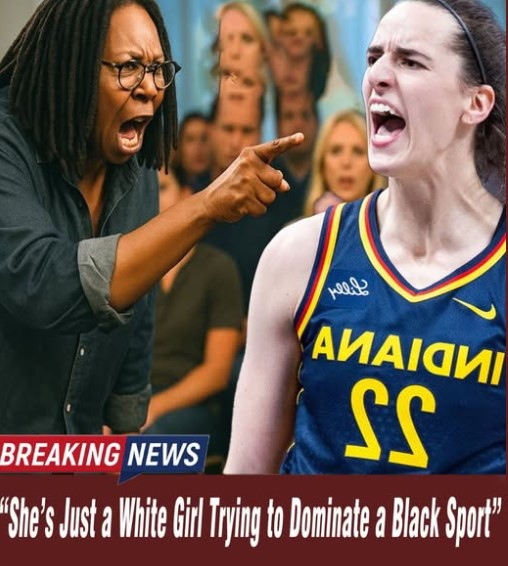Whoopi Goldberg Blasts Caitlin Clark on Live TV: “She’s Just a White Girl Trying to Dominate a Black Sport—and It’s Not Working”
In a moment that quickly ignited national debate, television host and actress Whoopi Goldberg delivered a controversial remark during a recent episode of The View. While discussing the rise of WNBA rookie Caitlin Clark, Goldberg suggested that Clark’s ascent represents a racial dynamic often overlooked in sports. Her words—“This is just another white girl trying to take over a Black sport”—were met with immediate silence in the studio and explosive reactions online.
Goldberg’s comment, delivered during a segment on Clark’s impact in the league, quickly spread across social media platforms, sparking polarized responses from fans, athletes, and cultural commentators. While some defended Goldberg’s statement as a critique of systemic bias in sports visibility, others labeled it divisive and racially inflammatory. Hashtags like #WhoopiOut and #StandWithCaitlin began trending within hours.
Caitlin Clark, known for her dynamic shooting and court vision, has become a defining face of the WNBA’s next generation. Her transition from a record-breaking college career at Iowa to professional stardom with the Indiana Fever has drawn massive attention to the league. With her growing popularity comes scrutiny—not only of her performance, but also of the broader cultural forces that shape who receives media attention, endorsement deals, and fan support.
Supporters of Goldberg argue her point reflects a long-standing concern: that the accomplishments of Black women in sports are often overlooked until a white athlete breaks through. They note that many Black players helped build the WNBA from the ground up, often without receiving comparable recognition or financial reward.
Indeed, the WNBA has historically been anchored by Black excellence. Legends like Sheryl Swoopes, Tamika Catchings, and Lisa Leslie laid the groundwork for today’s athletes, often without the national spotlight now shining on stars like Clark and Sabrina Ionescu. Goldberg’s remarks may have been provocative, but they tapped into real, unresolved tensions within the league.
Others, however, saw her statement as a step backward in efforts to build unity in women’s sports. Critics called it unfair and reductive, arguing that Clark’s success does not come at the expense of others. “Why can’t we celebrate talent without making it about race?” one user posted, echoing sentiments shared widely across social media.
Current WNBA stars quickly entered the conversation with more measured perspectives. Two-time MVP A’ja Wilson urged mutual respect, writing, “We need to celebrate ALL the women who built this league AND the ones bringing new eyes to it.” Former player and ESPN analyst Chiney Ogwumike emphasized the moment’s potential: “Women’s basketball is finally getting the attention it deserves. Let’s support each other and keep pushing for equality—for everyone.”
In response to the growing backlash, ABC released a brief statement affirming its commitment to open dialogue and diverse opinions. Goldberg later addressed the controversy herself, stating on Instagram: “I stand by my words, but I also stand for dialogue. If we want to grow as a sport and as a country, we need to talk about the hard stuff—even if it makes us uncomfortable.”
Clark, demonstrating maturity amid the storm, responded with calm professionalism:
“I’ve always respected the women who came before me and the players I share the court with. Basketball is for everyone. I just want to play, compete, and inspire the next generation—no matter who they are or where they come from.”
Her teammates echoed her sentiment, emphasizing unity and a shared commitment to the growth of women’s basketball.
This moment marks a turning point in the evolution of the WNBA. As the league experiences unprecedented attention, it is also being asked to confront deeper questions about race, visibility, and equity. These are not new conversations, but they are being amplified in the spotlight of a changing sports landscape.
The path forward for the WNBA—and for women’s sports as a whole—depends on how these conversations unfold. Will they divide or unite? Can they pave the way for greater inclusivity without sidelining difficult truths? One thing is certain: the game is growing, and its growth depends on recognizing the full history, diversity, and complexity of those who play it.
Source:
The Guardian – Whoopi Goldberg comments on Caitlin Clark spark controversy
